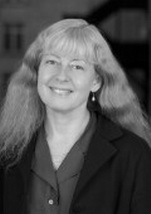Susan Williams

Dr Susan Williams is a Senior Fellow at the Institute of Commonwealth Studies, School of Advanced Study, University of London. Her books include "Who Killed Hammarskjöld?" (Hurst 2011); "Colour Bar. The Triumph of Seretse Khama and His Nation" (Penguin 2006); "The People’s King. The True Story of the Abdication" (Penguin 2003); "The Iconography of Independence: ‘Freedoms at Midnight’" (Routledge 2009).
Contents
Who Killed Hammarskjöld?
Between 1962 and 2011, a number of books, reports and papers were published concerning the background, circumstances and cause of the plane crash in which Dag Hammarskjöld was killed. In 2011, the year of the fiftieth anniversary of the crash, Dr Susan Williams’ book "Who Killed Hammarskjöld?" was published. It offered no definite answer to its own question, but it marshalled a striking quantity of evidential material which had come to light in the intervening years.[1]
One-day conference
A one-day conference to mark the 50th anniversary of UN Secretary-General Dag Hammarskjöld’s death was held at the University of London, Senate House, on Friday 2 September 2011 to discuss "Dag Hammarskjöld, the United Nations, and the End of Empire." The Convenors were Dr Mandy Banton and Dr Susan Williams of the Institute of Commonwealth Studies, School of Advanced Study, University of London.[2] Participants included:
- Professor Philip Murphy, Director of the Institute of Commonwealth Studies,
- Dr Henning Melber, Director of the Dag Hammarskjöld Foundation
- David Wardrop, Chairman, United Nations Association, Westminster Branch
- Dr Sarah Stockwell, Senior Lecturer in Imperial and Commonwealth History, King's College London
- Professor David Anderson, Professor of African Politics and Fellow of St Cross College, Oxford, 'The Cold War in Africa'
- Professor Wm. Roger Louis, CBE, Kerr Professor of English History and Culture and Director of British Studies at the University of Texas at Austin, 'Hammarskjöld, the United Nations, and the Middle East'
- Dr Benjamin Zachariah, Reader in South Asian History, University of Sheffield, 'The place of the United Nations in Indian foreign policy thinking'
- David Wardrop, Chairman, United Nations Association (UNA) Westminster Branch
- Dr Jean-Pierre Bat, University of Paris 1 Panthéon-Sorbonne and Centre d’étude des mondes africains (CEMAf), 'De Gaulle, Algeria and Françafrique'
- Dr Asahiko Hanzawa, Faculty of International Studies, Meiji Gakuin University, Tokyo, 'An invisible surrender: the United Nations and the end of the British empire'
- Ludo De Witte, Brussels, author of De Moord op Lumumba, 1999 [published in English as 'The Assassination of Lumumba', 2001], 'Belgium, the Congo, and the assassination of Patrice Lumumba'
- Dr Marion Wallace, African Curator, British Library
- Dr Edward Hampshire, Principal Records Specialist, Diplomatic and Colonial, The National Archives of the UK, 'The British official record'
- Declan Power, security and defence journalist, Dublin, 'The use of oral history to uncover the voices of Irish peacekeepers in the Congo'
- Hans Kristian Simensen, Gothenburg, Secretary to the Scandinavian Committee of the Bibliotheca Alexandrina, 'Ndola, 18 September: from witness statements to the official reports; more questions'
- Professor Manuel Fröhlich, Professor of Political Science, Friedrich-Schiller-University, Jena
- Lord Douglas Hurd of Westwell CH CBE PC diplomat, historian and former British Foreign Secretary
Enabling Committee
In response to Dr Williams’ book, Lord Lea of Crondall assembled an eight-person international Enabling Committee - on which Susan Williams served - and which, in 2012, set up the Hammarskjöld Inquiry Trust inviting Sir Stephen Sedley, a recently retired Lord Justice of Appeal for England and Wales, to chair the Hammarskjöld Commission of jurists to inquire into the disaster. Justice Wilhelmina Thomassen of the Netherlands, Justice Richard Goldstone of South Africa and Ambassador Hans Corell of Sweden agreed to serve with Sir Stephen as Commissioners. All have worked without remuneration.[3]
Report of the Hammarskjöld Commission
The 61-page Hammarskjöld Commission Report was presented on 9 September 2013 in the Historical Reading Room of the Peace Palace at The Hague in the Netherlands. The presentation meeting was chaired by the director of the Carnegie Foundation, Steven van Hoogstraten. The report was introduced by the Chairman of the Commission (Sir Stephen Sedley) and presented to the Chairman of the Hammarskjöld Inquiry Trust, Lord Lea of Crondall.[4]
References
- ↑ Who Killed Hammarskjöld? Susan Williams' formidable book book review by Dr Philip Muehlenbeck (The George Washington University)
- ↑ "Dag Hammarskjöld Conference - Draft Programme"
- ↑ "The Hammarskjöld Commission: Background"
- ↑ "Report of the Hammarskjöld Commission"